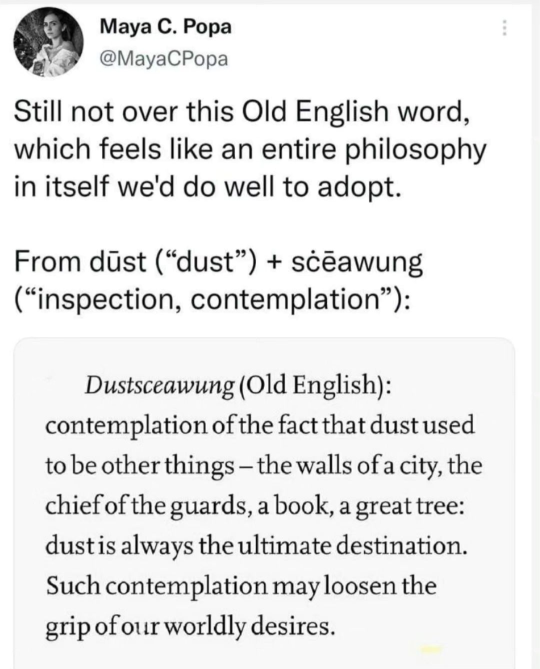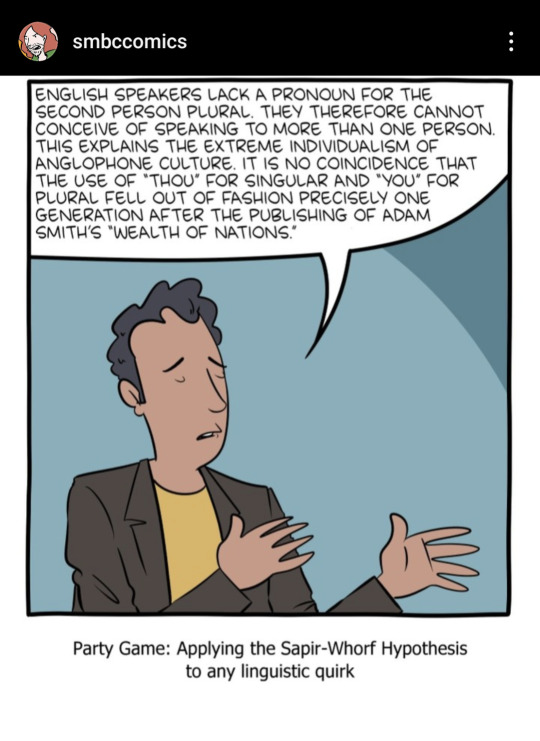#sapir-whorf hypothesis :)
Text
Sapir-Whorf discourse is just twitter discourse for linguists. They even make up guys (hard Sapir-Whorfists) to get mad at.
#linguistics#linguistic#languages#shitpost#linguist shitpost#lingblr#sapir-whorf#sapir-whorf hypothesis
13 notes
·
View notes
Text
Language, Thought, and Reality: The Interplay of Human Understanding
Language is more than a mere tool for communication; it's a fundamental element of human cognition that significantly shapes our perception of reality. The intricate relationship between language, thought, and reality has intrigued philosophers, linguists, and cognitive scientists for centuries. This intricate interplay not only influences how we express our ideas but also defines the very nature of our thoughts and, by extension, the way we perceive the world.
Language as a Lens to Reality
One of the most influential ideas in this realm is the Sapir-Whorf hypothesis, which posits that the structure and vocabulary of a language can mold and constrain the way its speakers think about the world. This concept comes in two flavors: linguistic determinism and linguistic relativism. Linguistic determinism suggests that language entirely determines the way we think, limiting our thoughts to what is expressible in our language. Linguistic relativism, on the other hand, holds that language influences thought but doesn't strictly determine it.
Consider, for instance, the linguistic distinction between colors. Languages vary in how they categorize and label colors. Some have more words for different shades of blue, while others may combine colors that speakers of different languages consider distinct. This variation can affect how people perceive and categorize colors. If a language doesn't have a distinct word for a certain shade, its speakers may be less likely to perceive it as a separate entity. In this way, language can serve as a lens through which we view and define our reality.
The Mind's Toolkit: Language and Concepts
Language, in its complexity, provides us with a toolkit for understanding and categorizing the world. Words are not just labels but also containers of meaning and concepts. They define boundaries, allowing us to separate, categorize, and convey information. The very presence of specific words in a language implies the importance of these distinctions to its speakers.
Furthermore, the structural components of a language, such as syntax and grammar, govern how ideas are connected and expressed. They provide a blueprint for how concepts are related within the realm of thought. Thus, language helps us not only to classify the world but also to construct our understanding of it.
The Cultural Dimension
It's important to recognize that language isn't just an individual phenomenon. It is deeply entwined with culture. The language a person speaks is often a reflection of their cultural background and can encompass shared beliefs, values, and worldviews. Cultural linguistics explores how a language's unique features emerge from and influence the culture it is embedded in.
Beyond Language
While the Sapir-Whorf hypothesis and the study of linguistic relativity highlight the significance of language in shaping thought and reality, they are not without controversy. Critics argue that thought and perception are not solely dictated by language. Concepts like non-verbal communication, universal human experiences, and innate cognitive structures challenge the idea of linguistic determinism.
In the grand scheme of philosophy, the relationship between language, thought, and reality remains an open question. Language undoubtedly plays a vital role in shaping our perception of the world, but its extent and limits continue to be topics of philosophical inquiry.
As we ponder the intricate connection between language, thought, and reality, we gain insight into the profound ways in which human beings engage with and understand the world. This philosophical exploration enriches our understanding of the human experience and broadens the horizons of cognitive science, linguistics, and cultural studies.
#philosophy#epistemology#knowledge#learning#ontology#chatgpt#education#metaphysics#psychology#Language and Thought#Language and Reality#Linguistic Relativism#Sapir-Whorf Hypothesis#Conceptual Frameworks#Perception and Language#Philosophy of Language#Cognitive Science#Reality Construction#Linguistic Determinism#Cultural Linguistics#Cognitive Whorfianism#Conceptual Boundaries#Language#Thought#linguists#Beyond Language#linguistics
11 notes
·
View notes
Text
I love the movie Arrival but it perpetuates one of the biggest myths in linguistics: that language influences how we think about time.
4 notes
·
View notes
Text
The notion that the continued presence of Anglicized names of Biblical figures into English translations of the Bible is driven primarily by conservative politics not only plays into the (discredited and arguably racist) Sapir-Whorf hypothesis, but is easily disproven by Messianic Jewish translation which re-Hebraicize the names and are used by primarily by political conservatives.
#Orthodox Jewish Bible#Complete Jewish Bible#CJB#OJB#Sacred Name movement#No This is not an endorsement of any of these translations#The presence of Hebraic forms of these names is interesting#But these translations otherwise use a Frankensteined Hebrew-English mishmash that isn't used outside a subset of Messanic Judaism#Messianic Judaism#Sapir-Whorf hypothesis#sapir whorf hypothesis#Sapir Whorf#Sapir-Whorf
0 notes
Text
Linguistic Relativity: Does Language Shape Our Reality?
The Hypothesis
The Sapir-Whorf hypothesis, also known as linguistic relativity, presents a captivating proposition: the structure and vocabulary of a language influence the way its speakers perceive and interact with the world. As we embark on an exploration of this intriguing concept, we delve into the depths of linguistic relativity, questioning the extent to which language serves as a…

View On WordPress
#Bilingualism and Cognition#Cognitive Effects of Language#Color Perception and Language#Contemporary Research on Linguistic Relativity#Cultural influence on language#education#english-language#english-learning#Grammatical structures#inglés#language#Language and Cultural Understanding#Language and Perception#Language and Reality#Language and thought#language-learning#languages#learn-english#learning#Lexical Gaps#Linguistic relativity#Metaphors and cognition#Sapir-Whorf hypothesis#Spatial and Temporal Concepts
0 notes
Text
Back in the Land of the Almost
I have decided to be better today. Sometimes it’s a matter of taking an executive decision and telling yourself ‘today, I am better.’ This won’t work of course if you’re still actually ill, but sometimes you can be just on the cusp and either decide to continue being unwell or to get on with things. It was a nasty cough I had; not too bad in the mornings but really hacking in the afternoons and…
View On WordPress
#Google Earth#hacking cough#Sapir-Whorf hypothesis#steroids#the brain and languages#Thyroxine#what does three hundred million years look like?#word of mouth
0 notes
Text
Guy who has misunderstood the Sapir-Whorf hypothesis so badly that he thinks painting himself teal will render him invisible in Japan and makes this the entire crux of his planned bank heist.
0 notes
Text
Unraveling the Sapir-Whorf Hypothesis: Exploring Language's Impact on Thought and Perception
The Sapir-Whorf Hypothesis: Exploring the Linguistic Relativity of Thought and Perception
The Sapir-Whorf hypothesis, also known as linguistic relativity, suggests that the structure and content of a language significantly influence the way its speakers perceive and think about the world. This controversial hypothesis has sparked intense debates and captivated the attention of linguists,…

View On WordPress
#cognitive processes#cross-cultural studies#cultural diversity#language and cognition#language influence#linguistic determinism#linguistic relativity#Sapir-Whorf hypothesis
1 note
·
View note
Text


315 notes
·
View notes
Text
3 Word Review: “Babel-17” by Samuel R. Delany -
Fascinating sf yarn from a master world-builder on how our language might be manipulated against us.
#bookworm#literature#book reviews#read read read#books#3 words#samuel r delany#babel 17#science fiction#sapir whorf hypothesis#language#scifi#black literature#lgbtqia
20 notes
·
View notes
Text
Today, Benjamin Lee Whorf would have turned 127.
Here a podcast on the Sapir-Whorf hypothesis. Enjoy!
11 notes
·
View notes
Text
New fic!

Title: Softest of Tongues
Fandom: Lord of the Rings (and a bit of Silmarillion, but mostly it's set in the Third Age).
Rating: M
Length: 7800 words
Pairing: Galadriel/Celeborn
Summary: Canon-compliant. Galadriel and Celeborn over the years of the Third Age.
Sample:
There are ways to express the difference between ‘you wanted’ and ‘I wish you wanted’ in Quenya by adding the right affix. In Sindarin you must change the sounds of the verb itself, the feeling soaking into the substance of the word. What is the lenited form of grief, he thinks. What is the right declension for a yearning without a name.
Note: I have been working on this one on and off for AGES and I'm really happy with how it turned out. It ended up being much more about language and the differences between Quenya and Sindarin than I thought it would and as a result - well, WHO KNEW that AO3 had a character limit for author's notes. Not me! But I do now.
This is also the first new LOTR fic that I have written since 2005. Pls remember next time you fear tnat an AO3 author has abandoned writing, sometimes we just go dormant for 18 years like a species of cicada.
#eyeofacat fic#lotr fic#galadriel x celeborn#celedriel#galadriel#celeborn#elf cultural differences#everyone's got feelings about Doriath#sapir-whorf hypothesis as metaphor for the pain at the heart of your marriage
22 notes
·
View notes
Text
I saw The Host (2006), which kind of surprised me with how effective it was as a horror films and a tragedy. Now if I can just make it to both Barbie and Oppenheimer I can speedrun unlocking shrimp emotions
#shrimp version of the Sapir-Whorf hypothesis where seeing more colors lets you feel more emotions#film crit
10 notes
·
View notes
Text
Me Taking a Communications Class with a Bunch of People who Don't Know Linguistics feat. Some of the Worst Takes on the Sapir-Whorf Hypothesis I've Ever Heard
#'if i spoke a language that used the same word for orange and red it could lead to significant miscommunication because i might be talking#bout one of those colors and the other person would think i mean the other! this means that english is the best language and has the most c#mplex color vocab ever! i'm so glad i know the difference between red and orange!'#AAAAHGHGFGHGJIGH PLEASE. THIS IS TORTURE#GIRL. THATS NOT HOW IT WORKS#languages cannot practically name every “different color” in the visible spectrum. color categories are a human construct. please stop#linguistics#im going crazy#sapir whorf hypothesis
10 notes
·
View notes
Text
Now and then I revisit Cantonese (my first language) romantic pop songs whenever I feel like it, which I just did, and whoa. The rich lyricism and descriptiveness never fail to captivate me every time. I wish I could translate it fully, but there's a lot of nuance in a single Cantonese sentence that can't be replicated in English. Maybe that's why the emotion of love has always been a visual thing to me that I can never quite put into words in writing, granted that all my works are written in English.
Nothing tugs at your heartstrings like love songs in your native tongue. I guess.
#something something sapir whorf hypothesis#if only english weren't a low context language#I feel like so much more can be succinctly conveyed in it#cantonese#hong kong#contopop
4 notes
·
View notes
Text
believe it or not but assigning morality to phones/phonemes isn’t the haha quirky little joke you think it is!
#like that has uh. a History!#elli rambles#there are definitely some Posts in the linguistics tag sometimes.#it definitely isn’t the most egregious example I’ve seen/heard and the op probably didn’t mean anything by it but. hm!#haha funny alignment chart. now quick tell me what you think about foreign languages. or the sapir-whorf hypothesis perhaps.#ok to take off my Silly Mask for a moment: what I’m getting at with those understatements is that assigning morality/any qualities really to#language has a bigoted—& more specifically: usually racist—history. language has often been used as a tool & justification for oppression.#take a look at the languages currently & historically deemed ‘pretty’ or ‘civilised’. compare that with the ones deemed ‘ugly’ or ‘barbaric’#who speaks them? exactly which features make them ‘worthy’ of those adjectives? is it only phonetics? if so: in what way exactly?#is the categorisation of sounds of speech as having certain inherent qualities truly objective—or do they happen to align with certain#cultural or personal biases? what purpose does this categorisation serve?#are a people deemed ‘barbaric’ because the language they speak is inherently & objectively barbaric—or is it perhaps the other way around?#could this type of view of a language possibly be used to justify the subjugation of its speakers under the guise of ‘civilising’ them?#Perhaps?#which is obviously not to say phonetic features are the only ones used to assign certain qualities to languages! but it was what the post#I’m referencing was about so#anyway sorry I went off on a tangent. I just feel quite strongly about this#languageposting
6 notes
·
View notes